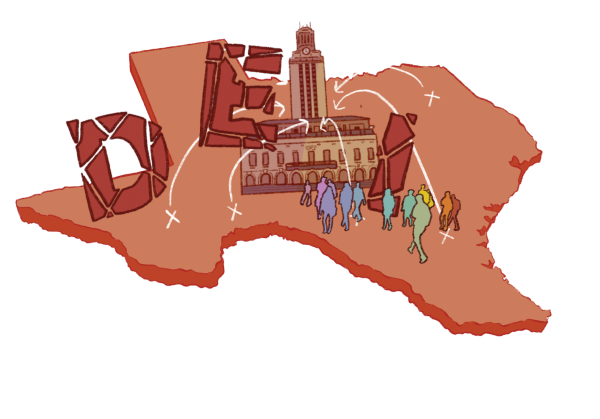Referee Racism and Biases in Sports
April 14, 2021
In December 2020, the National Association for the Advancement of Colored People (NAACP) and the LBJ High School football team filed a complaint with the University Interscholastic League (UIL). At their state semifinal game in Humble, Texas, against Lindale High School, some parents and players felt the referee was being racist in his calls.
After the game, LBJ parents called and wrote to the Austin branch of the NAACP. After looking through the complaints, Nelson Linder, the branch president, filed a complaint with UIL.
“The parents called me up,” Linder said. “I got a lot of complaints, about 20 to 30 letters, based on the number of complaints I received, and what they were saying was very similar. We went ahead and filed a complaint. That’s what the parents wanted and some of the students too. We had a lot of anonymous phone calls, so it was very clear to me that something was going on.”
The team was winning at halftime, but afterwards the referees started to make controversial calls. Brendan Jones, a senior on the LBJ football team, was at the game.
“We were up, I believe, 28-7 at halftime, or 27-7, something crazy like that,” Jones said. “And then, coming out of halftime, we scored twice, and the referees called back both of our touchdowns. And there were just a lot of calls that were called for us, but not for the other team.”
Jones also said that Lindale players were using racial slurs during the game. Afterwards, there were social media posts with slurs as well.
“There was a post on Twitter and on other social media platforms, it was a bunch of racial slurs being thrown around and a whole bunch of racist phrases from a whole bunch of other people,” Jones said. “And then during the game, the players on the other team called us racial slurs, and just stuff like that. And I wouldn’t say it’s uncommon in football, but it was done a lot more than what usually happens.”
Linder thinks the official could have been influenced by the LBJ team kneeling during the pledge. All season, the team had knelt during the pledge in a silent protest.
“The LBJ team, all year, basically took a knee like Colin Kaepernick before the game, and that was very unpopular in many places,” Linder said. “You can imagine in East Texas, that environment there, basically, a Black team takes a knee, and it brought up a lot of conflict that was happening all over the country. And I think that action and their reputation created a very explosive environment in terms of race and misunderstanding. And I think that affected the game. It was much bigger than football for me.”
However, filing a complaint didn’t change the outcome of the game, and the game won’t be replayed according to LBJ athletic director and head football coach Jahmal Fenner. Fenner said they wanted to file a complaint to raise awareness about the issue.
“We just felt that we wanted to bring awareness, it’s not the first time we felt like we’ve been in a competitive game or competing, the odds were against us for whatever reason, and it was outside of just playing the game of football,” Fenner said. “We’ve experienced that before.”
The UIL took the complaint to the Texas Association of Sports Officials, who sent a letter back to LBJ. UIL responded saying that the calls were poor judgement on the part of the official.
“The UIL turned it over to the Texas Association of Sports Officials,” Fenner said. “So I followed the process with that and they did respond. They pretty much stated that it was judgment calls by the officials, and it could have gone either way. So they really didn’t do anything as far as with the complaint we filed.”
According to Jones, most of the players on the LBJ team were upset about the game. There were many seniors on the team who felt like the opportunity to go to the state final was taken away from them, Jones said.
“A lot of the players that were more involved in the game, they’re highly upset about it and they wish the outcome was different,” Jones said. “It was a lot of our senior years, we were senior-heavy on our team, so we don’t get another go at it, and we worked really hard this summer to prepare for it just to be cheated out of it.”
The Lindale team has not commented on the complaint. According to Linder, the coach ignored it.
“Which is fine for him,” Lindale said. “He chose not to engage, he just kind of brushed it off and they lost tonight, they didn’t win the title, but he kind of brushed it off, which I knew he would.”
This isn’t the first time LBJ games have been poorly officiated. Jones said officials have been unprofessional in the past, but never to this extent.
“We get a lot of dirt from officials just because we’re LBJ, and during previous seasons, they built up our reputation as being undisciplined and stuff like that,” Jones said. “But this year specifically, with the team that we had, no, it didn’t really happen — we were a very disciplined team.”
Fenner said this does happen at least once or twice a season to the team, but they don’t file complaints. Instead, Fenner can recommend that the team not get the same referee at another game.
“In the coaching profession, there is a process that you follow to file a complaint with officials,” Fenner said. “I’ve been the head coach for three years, and usually, when I have a poorly officiated game, I just don’t get those officials, and that’s usually kind of a process that you take, you just scratch those officials. So that’s kind of what we’ll do from here forward if that crew ever tries to officiate one of our games — we will recommend not having them.”
Sports and race have a long history together. According to Linder, racism has been, and still is, an issue in sports.
“Sports is very powerful because everybody notices,” Fenner said, “So absolutely, it’s been a big factor, and oftentimes, it’s a very positive thing because you’re breaking down barriers.”
Linder said that he’s glad the NAACP filed a complaint. He thinks it’s important for people to recognize when there is cheating and when to take action.
“I think by doing this, we made a very loud statement and it got coverage all over all over the state, in fact around the country,” Linder said. “So we did the right thing here, so we hope those kids know we respect them and we’re going to encourage them, this happens in life. See, there are lessons learned here. Because when you get out of school, you’re going to see racism all over this country. You never give up, you stand up, and you keep going forward.”









